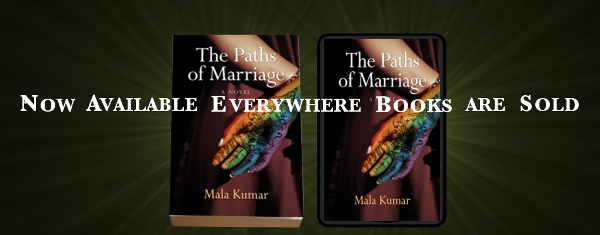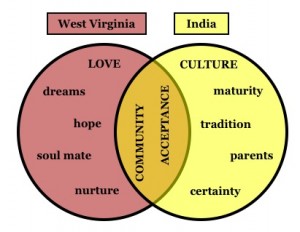 This is the final post of the series that examines topics from the perspective of the characters in the upcoming novel, The Paths of Marriage which will be for sale starting 1 October 2014.
This is the final post of the series that examines topics from the perspective of the characters in the upcoming novel, The Paths of Marriage which will be for sale starting 1 October 2014.
“The Narrative of Marriage” is written from the point of view of the character, Pooja Deva.
Kids these days have no filter. Especially the hipsters. In fact, I believe one of their favorite hashtags is quite literally #nofilter. It’s ridiculous.
Many of those #nofilter hipster students of mine have somehow decided it’s okay to pry into the personal life of their professor (me) in lieu of researching traffic circles for their next Intro to Urban Studies assignment. So, in an effort to get the legions of intro students to put down their iPhones and pay attention to my brilliance, here is one aspect of the answer to that insufferably complicated question:
“Why did you agree to have an arranged marriage?”
There is one thing every place I have ever been to has in common – people want to be recognized as great by their community. I’m not talking about “ironic acceptance” the little hipster students peddle as the beacon of all achievements. I mean actual, undisputable, unequivocal recognition of being great. Some of my students would want this acceptance in the form Twitter infamy, some would want to be rich, but everyone wants to be known as great, regardless of the way the recognition is doled out.
The people I grew up with in 1970s West Virginia were no different. They all wanted to be touted as great by their community, and as the story often goes in the South, one easy way to greatness was to have a fairy-tale love story. Little else could exponentially elevate whatever popularity one had on their own than to be deeply, madly in love with their social counterpart. There’s a reason why the head cheerleader always dates the quarterback in high school, even – as was the case in my high school – if the quarterback was meant to be with the class nerd. Everyone wants greatness in their own way, and most of us aren’t above some disingenuous gestures to get there.
Like 1970s West Virginia, the Indian community also prides acceptance. My mother would still surely use her life story as an explanation as to why she forced me to have an arranged marriage. While it took me time to give this notion credit, we both know there was an element of community acceptance to her methods. Whether for love or as arranged, the narrative of marriage is told differently, but has the same basis.
Consider the words both societies use to describe the act of marriage
 The fantasy behind the words of the West Virginia narrative of marriage is nearly universally appealing. Who wouldn’t want a nurturing relationship with their soul mate that speaks to their hopes, dreams, and desire for LOVE? But, as someone who had less than a mountain of respect for that community that largely thought evolution was invented by the Devil, it was easy enough to see past that idealistic story. It wasn’t hard to reject the narrative of marriage I heard in high school, especially since I had so often been rejected in high school for being different.
The fantasy behind the words of the West Virginia narrative of marriage is nearly universally appealing. Who wouldn’t want a nurturing relationship with their soul mate that speaks to their hopes, dreams, and desire for LOVE? But, as someone who had less than a mountain of respect for that community that largely thought evolution was invented by the Devil, it was easy enough to see past that idealistic story. It wasn’t hard to reject the narrative of marriage I heard in high school, especially since I had so often been rejected in high school for being different.
There’s no doubt that I wish I had had the option to write my own narrative of marriage, but as you will hopefully read when my story comes out, you’ll see that wasn’t exactly a real choice. Even though I knew getting an arranged marriage wasn’t my personal ideal scenario, the idea of being accepted as mature, culturally astute, and able to seize a certainty by my parents was appealing. Their approval was as close to that sense of community lauding I could get given where I was raised. Simply put, not accepting the marriage narrative of West Virginia made it easier to not reject the Indian narrative.
It may seem radical and illogical to many people who grew up in societies where marriage is always predicated on the idea of finding love. But truth be told, as a college professor, I find similar and smaller examples of this rejection of the norm to fit in with the alternative all the time. I mean seriously, why else would it be a HUGE fashion trend among these same hipster children to wear glasses without lenses? It’s illogical to the outside world, but in some small stroke, it makes sense to us. After all, the need to find acceptance sometimes makes us do crazy things. In my case, it was a contributing factor to having an arranged marriage. But at least my glasses are real.
Now for the last time, will you all please do your damn homework?
Buy the book on 1 October 2014. This is one powerful story you will never forget.
The complete The Paths of Marriage character series:
Deepa Deva – Implicit Outings on Facebook
Pooja Deva – The Narrative of Marriage
Lakshmi Deva – Pacing Oneself was not an Immigrant Option
Audrey Girard – How to Start a Conversation, American vs France
Anand Suresh – We all Spoke English, just not the Same Language
Alpa Deva – A Straight Coming Out Story